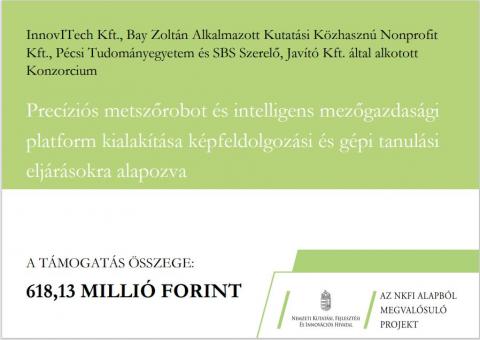

The project is implemented in the form of a consortium, InnovITech Ltd., is responsible for the development of software solutions, relying on the viticultural expertise of the University of Pécs. The robotics expertise is provided by the Zoltán Bay Research Institute Nonprofit Ltd., which is complemented by the competence of SBS Ldt., in the development of vehicle technology platform.
The aim of the development is to create a self-propelled robot which can carry out complex robotic tasks on the vineyards by, processing and analyzing detected camera images of surrounding environment. This automated robotic technology replaces the high human resource capacity required to carry out the task of precision grape pruning.
As a result, we have created an autonomous viticulture, pruning vector robotics solution which can determine and execute automated pruning on vine fields, possessing the knowledge of experienced viticulture specialists. This automated technology can reduce the increasing shortage of expertise and labor in the field, and allowing weather-independent, optimal timing of pruning to be carried out on vineyard plants.
The robot will be able to automatically map a plantation, based on which it establishes the optimal pruning protocols and different options of transformation of the grape capital. Also, it is capable of monitoring and analyzing the grape crops to identify the balance of production, yield and quality.
Robotic movement and automation of pruning is backed by machine learning techniques that allow to detect and consider new expert decision-making procedures. The observed correlations in relation to the methods of pruning and decisions used, may lead to the discovery of new research results related to the development of viticulture methods and forming the basis of prospective viticulture research.
The subsequent evaluation of the decision automation related to pruning is backed by the capability of the system to examine the effectiveness per capital and to evaluate the applied pruning techniques, by continuously monitoring the plantations and examining the data collected based on big data procedures. Therefore, the robot provides an opportunity to transition to precision farming.
In addition to the above, the special advantage and wide social utility of the robotic solution and system is, that it can support the training of viticulture by modeling individual pruning decision situations with the simulation module of vine capitals. Therefore, contributing to the further refinement of the self-learning mechanism related to pruning vectors. The originated knowledge material can be connected to a training system. During the viticulture training, this capability of the developed system can provide an extremely useful support, which can also be interpreted as a marketing advantage. Finally, it also supports the continuous development of the decision bases.
Project ID: 2020-1.1.2-PIAC-RDI-2020-00097
Amount of subsidy: HUF 618,130,379
